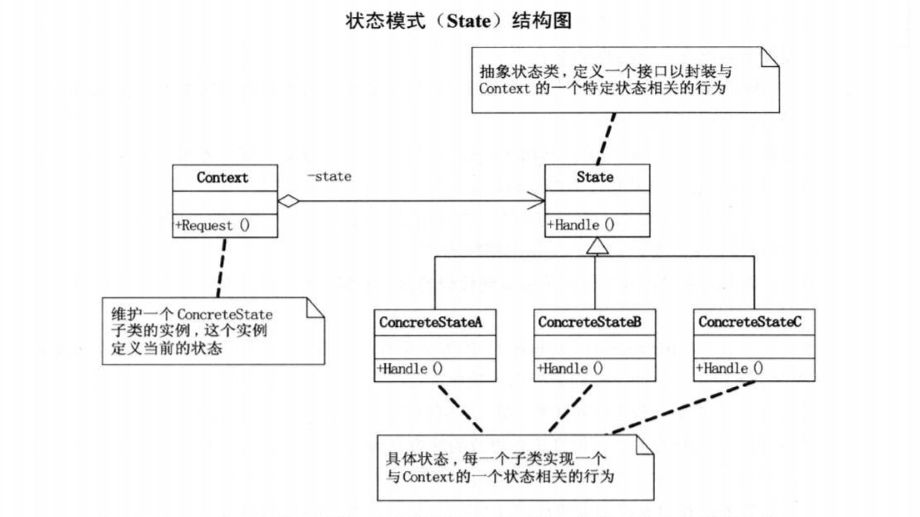Design mode -- state mode (JAVA)
Posted by Johnlbuk on Fri, 05 Jun 2020 06:22:04 +0200
Model introduction
/**
*
*/
/**
*State mode
*Motivation: allows an object to change its behavior when its internal state changes, and the object appears to modify its class.
*Problem solved: allows an object to change its behavior when its internal state changes, and the object appears to modify its class.
*Advantages:
*1. Encapsulate the transformation rules.
*2. Enumerate possible states. Before enumerating States, you need to determine the state type.
*3. Put all behaviors related to a state into a class, and easily add new states. Only changing the state of the object can change the behavior of the object.
*4. Allow state transformation logic and state object to be integrated, rather than a huge conditional statement block.
*5. Multiple environment objects can share a state object, thus reducing the number of objects in the system.
*Disadvantages:
*1. The use of state mode will inevitably increase the number of system classes and objects.
*2. The structure and implementation of state mode are complex. If it is not used properly, it will lead to confusion of program structure and code.
*3. The state mode does not support the "open close principle". For the state mode that can be switched, adding a new state class requires modifying the source code responsible for the state transition, otherwise it cannot be switched to the new state, and modifying the behavior of a state class also requires modifying the source code of the corresponding class.
*Usage scenario:
*1. The scene where the behavior changes with the change of state.
*2. Substitute of condition and branch statement.
*
* @author
*
*/
example
public class Demo1 {
public static void main(String[] args) {
Work project = new Work();
project.setHour(8);
project.WriterProgram();
project.setHour(10);
project.WriterProgram();
project.setHour(12);
project.WriterProgram();
project.setHour(14);
project.WriterProgram();
project.setFinish(false);
project.setHour(17);
project.WriterProgram();
project.setHour(22);
project.WriterProgram();
}
}
class Work{
private int hour;
private Boolean finish =false;
public int getHour() {
return hour;
}
public void setHour(int hour) {
this.hour = hour;
}
public Boolean getFinish() {
return finish;
}
public void setFinish(Boolean finish) {
this.finish = finish;
}
public void WriterProgram() {
if(hour<12) {
System.out.println("Current time:"+hour+"O'clock, morning, spirit");
}else if(hour<13) {
System.out.println("Current time:"+hour+"O'clock, noon, eating and sleeping");
}else if(hour<17) {
System.out.println("Current time:"+hour+"It's a good afternoon");
}else {
if(finish) {
System.out.println("Current time:"+hour+"It's time to go home");
}else {
if(hour<21) {
System.out.println("Current time:"+hour+"It's time to go to sleep");
}else {
System.out.println("Current time:"+hour+"Point. I can't hold it. I'm asleep");
}
}
}
}
}
public class Demo2 {
public static void main(String[] args) {
Context c =new Context(new ConcreteStateA());
c.Request();
c.Request();
c.Request();
c.Request();
}
}
abstract class State{
public abstract void Handle(Context context);
}
class ConcreteStateA extends State{
@Override
public void Handle(Context context) {
context.setState(new ConcreteStateB());
}
}
class ConcreteStateB extends State{
@Override
public void Handle(Context context) {
context.setState(new ConcreteStateA());
}
}
class Context{
private State state;
public Context(State state) {
this.state = state;
}
public State getState() {
return state;
}
public void setState(State state) {
this.state = state;
System.out.println("Current status:"+state.toString());
}
public void Request() {
state.Handle(this);
}
}

public class Demo3 {
public static void main(String[] args) {
Context_Work project = new Context_Work();
project.setHour(8);
project.WriterProgram();
project.setHour(10);
project.WriterProgram();
project.setHour(12);
project.WriterProgram();
project.setHour(14);
project.WriterProgram();
project.setFinish(false);
project.setHour(17);
project.WriterProgram();
project.setHour(22);
project.WriterProgram();
}
}
interface State{
void writeProgram(Context_Work w);
}
class shangwuState implements State{
@Override
public void writeProgram(Context_Work w) {
if(w.getHour()<12) {
System.out.println("Current time:"+w.getHour()+"O'clock, morning, full of energy");
}else {
w.setState(new zhongwuState());
w.WriterProgram();
}
}
}
class zhongwuState implements State{
@Override
public void writeProgram(Context_Work w) {
if(w.getHour()<13) {
System.out.println("Current time:"+w.getHour()+"Point, noon, lunch break");
}else {
w.setState(new xiawuState());
w.WriterProgram();
}
}
}
class xiawuState implements State{
@Override
public void writeProgram(Context_Work w) {
if(w.getHour()<17) {
System.out.println("Current time:"+w.getHour()+"O'clock, afternoon, keep working");
}else {
w.setState(new bangwanState());
w.WriterProgram();
}
}
}
class bangwanState implements State{
@Override
public void writeProgram(Context_Work w) {
if(w.isFinish()) {
w.setState(new xiabanState());
w.WriterProgram();
}else {
if(w.getHour()<21) {
System.out.println("Current time:"+w.getHour()+"Work overtime");
}else {
w.setState(new shuijiaoState());
w.WriterProgram();
}
}
}
}
class shuijiaoState implements State{
@Override
public void writeProgram(Context_Work w) {
System.out.println("Current time:"+w.getHour()+"Go to sleep");
}
}
class xiabanState implements State{
@Override
public void writeProgram(Context_Work w) {
System.out.println("Current time:"+w.getHour()+"Go home from work");
}
}
class Context_Work{
private State state;
private int hour;
private boolean finish =false;
public Context_Work() {
state = new shangwuState();
}
public State getState() {
return state;
}
public void setState(State state) {
this.state = state;
}
public int getHour() {
return hour;
}
public void setHour(int hour) {
this.hour = hour;
}
public boolean isFinish() {
return finish;
}
public void setFinish(boolean finish) {
this.finish = finish;
}
public void WriterProgram() {
state.writeProgram(this);
}
}
